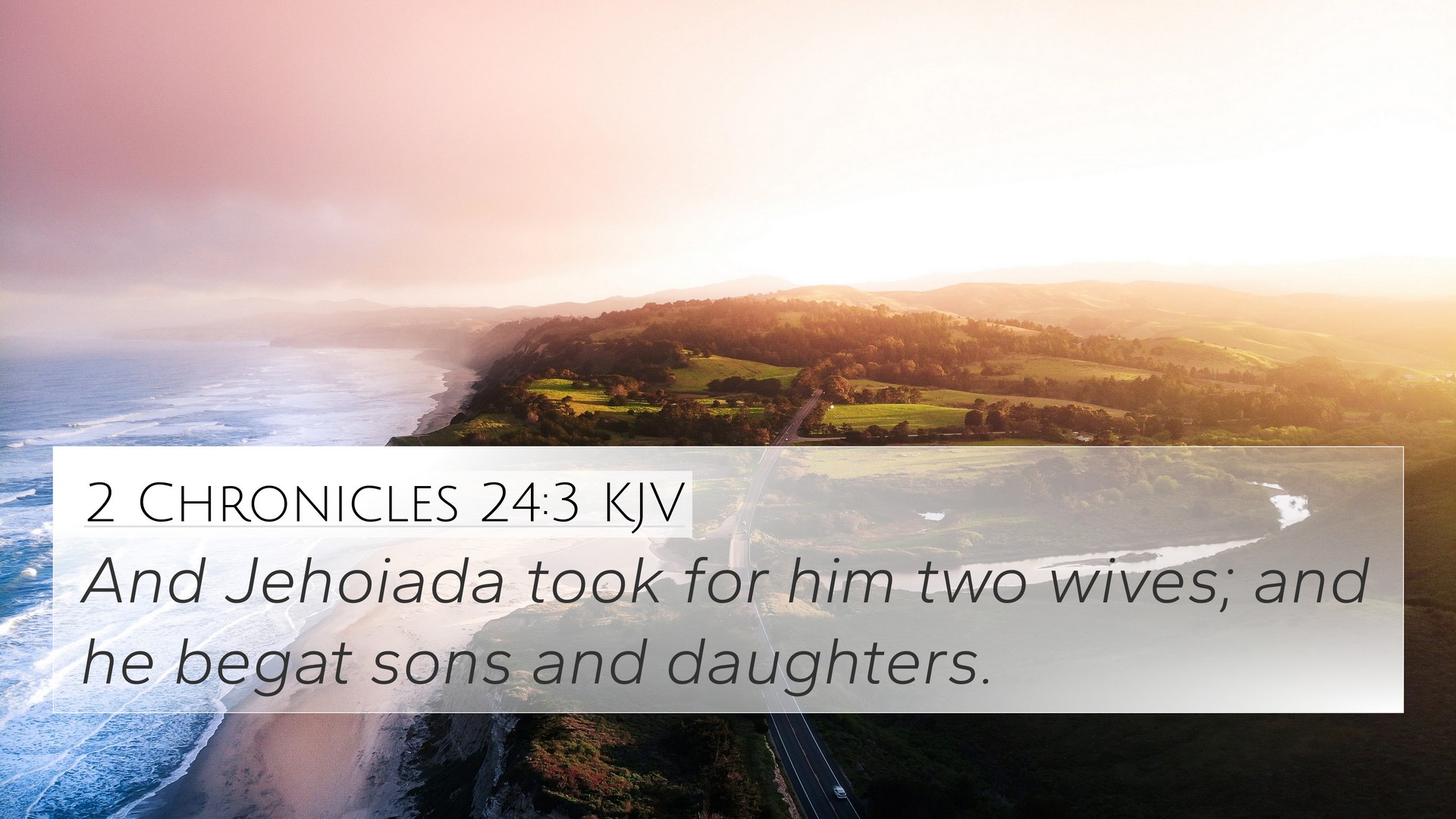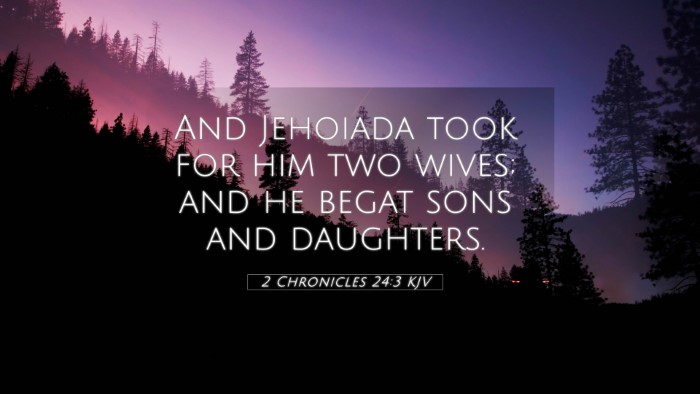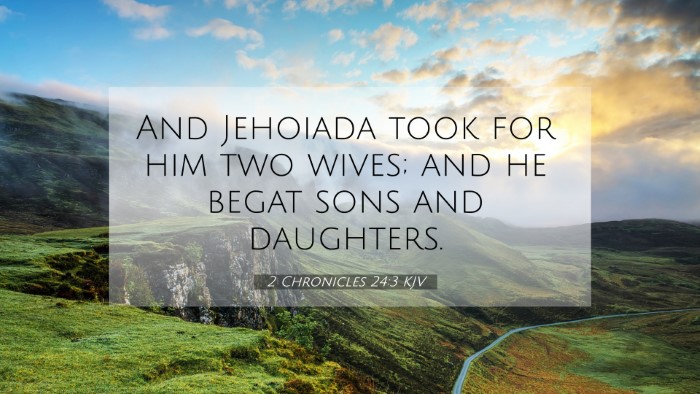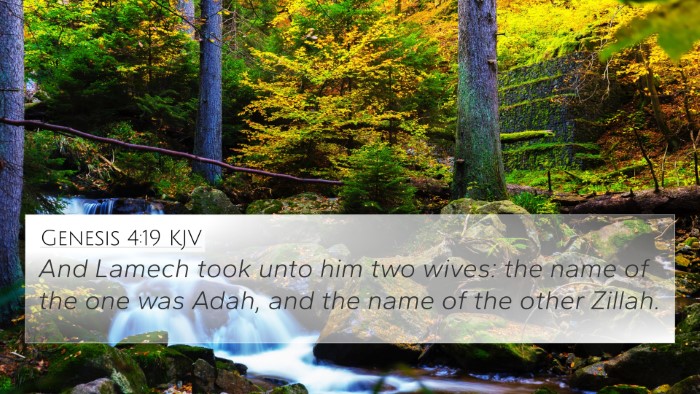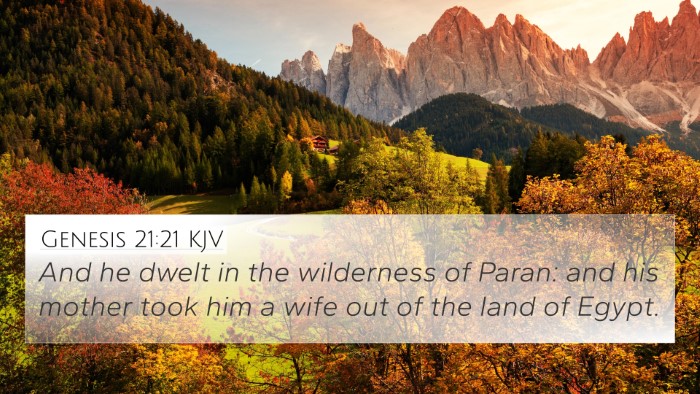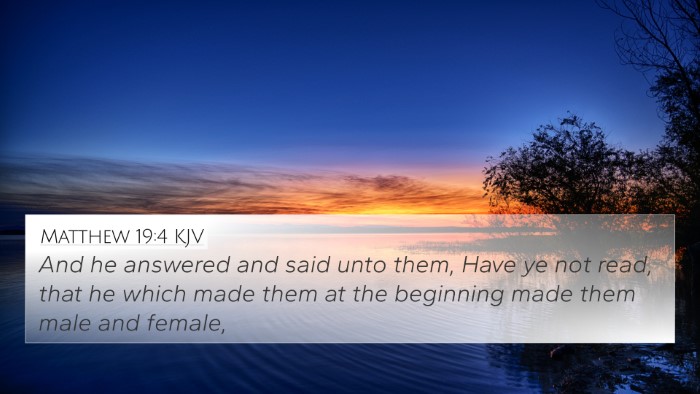Understanding 2 Chronicles 24:3
Verse Text: “And Jehoiada took for him two wives; and he begat sons and daughters.” (2 Chronicles 24:3)
Summary and Context
This verse refers to King Joash (also known as Jehoash) and highlights the actions of Jehoiada, the high priest, during Joash's reign in Judah. Jehoiada was instrumental in crowning Joash as king and led significant religious reforms. This verse underscores the continuation of Joash's lineage as a vital aspect of the Davidic line, emphasizing the importance of marital alliances in preserving the royal bloodline.
Commentary Insights
-
Matthew Henry’s Commentary
Henry points out that Jehoiada’s actions in taking wives for Joash signify the importance of family in leadership roles. He notes that ensuring the king’s descendants were appropriate for ruling was part of maintaining God’s covenant with David regarding the continuance of his lineage on the throne of Judah.
-
Albert Barnes’ Notes
Barnes comments on the significance of Joash's marriage, suggesting that his two wives not only signify his royal status but also reflect the cultural practices of the time where kings often had multiple wives to secure political alliances. This act of marriage could also symbolize the establishment of a firm foundation for Joash's reign, aiming for stability and continuity.
-
Adam Clarke’s Commentary
Clarke emphasizes the role of Jehoiada in guiding Joash. He notes that two wives were typical for kings of Judah and served the purpose of fostering alliances. Clarke further suggests that the naming of sons often reflects God's providence and the fulfillment of His promises, linking Joash's reign to the larger narrative of Israel's history.
Bible Cross-References
This verse connects to several other biblical passages that enhance its meaning and context:
- 1 Chronicles 3:10-12 - The genealogical record of David’s line, emphasizing the importance of lineage.
- 2 Kings 11:12-16 - The account of Joash's coronation as king, providing insights into Jehoiada's role.
- 2 Chronicles 23:16 - Jehoiada establishes a covenant that legitimizes Joash’s kingship.
- 2 Chronicles 28:1 - A contrasting king's reign that exemplifies disobedience leading to downfall.
- Psalm 89:3-4 - God's promise about the continuity of David's descendants as foundational to the monarchy.
- Jeremiah 33:17 - A promise of the perpetuity of David's line, confirming God’s covenant.
- Matthew 1:12-16 - The genealogy of Christ, tracing back to David and highlighting the importance of lineage in Jewish tradition.
Thematic Connections
This verse fits into several broad themes found throughout the Bible, which can be explored using cross-referencing methods:
- Divine Sovereignty: The way God governs history through lineage and covenant, as seen in the connections between various kings and the prophetic implications.
- Leaders and Legacy: The role of leadership in the biblical narrative often involves family and marital alliances to secure political power (e.g., Solomon’s relationships in 1 Kings 11).
- Covenantal Promises: God's continuous preservation of David’s line throughout the Old and New Testaments, linking to the messianic promises found in Scriptures.
Significance for Biblical Study
Understanding 2 Chronicles 24:3 provides valuable insights not only into the life of Joash and his relationships but also into the broader theological themes of lineage, divine promise, and the continuity of leadership in Israel. By employing Bible cross-reference tools, scholars and learners can trace the intricate connections between this verse and others, enhancing their understanding of God's overarching narrative.
Exploring Connections
In studying this verse, it is crucial to link it with others that relate to the establishment of kingship, God’s promises, and the fulfillment of biblical prophecies regarding the lineage of David. By identifying these connections, one can see the richness of the scriptural tapestry and the inter-Biblical dialogue that encapsulates God's plan for His people.
Cross-Referencing Techniques
Utilizing tools such as Bible concordances and Bible cross-reference guides will aid in uncovering deeper layers of meaning within the text. A comparative Bible verse analysis can provide context on how kings like Joash were viewed in relation to their faithfulness to God as seen in passages like 2 Kings 12:2.
Conclusion
2 Chronicles 24:3 serves not only as a historical account of Joash’s life but also as a rich source for theological reflection. By employing cross-referencing methods, believers and students of the Bible can gain further insights into how God’s promises manifest through generations and how the narratives interlink to form a cohesive story of redemption.
